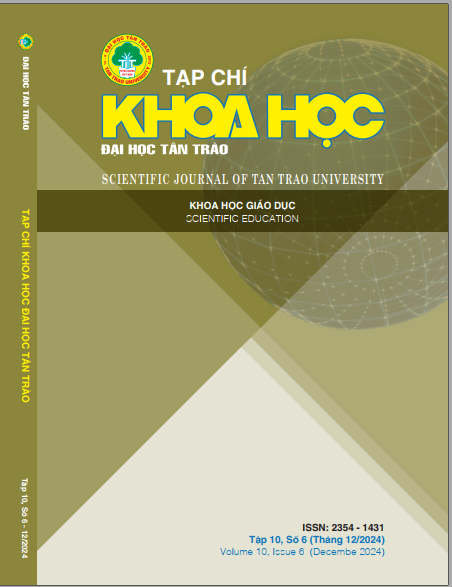ROBUST STABILIZATION OF CONFORMABLE FRACTIONAL-ORDER ONE-SIDED LIPSCHITZ NONLINEAR SYSTEMS VIA OBSERVER-BASED CONTROL
DOI:
https://doi.org/10.51453/2354-1431/2024/1245Keywords:
Conformable fractional-order systems; One-sided Lipschitz nonlinearity; Observer-based control; Lyapunov functional method; Linear matrix inequalityAbstract
This paper addresses the problem of robust stabilization for conformable fractionalorder nonlinear systems with one-sided Lipschitz conditions using observer-based control. Conformable fractional calculus is appropriate for a variety of real-world applications since it provides a more adaptable mathematical framework for explaining the dynamics of systems that display both integer and fractional-order behaviors. The key feature of this work is the use of the one-sided Lipschitz property, which relaxes the global Lipschitz condition, allowing for more general nonlinearities. By constructing an appropriate state observer, we estimate unmeasured states and develop a control law that guarantees asymptotic stabilization. Sufficient conditions for the existence of the observer and the controller are derived based on linear matrix inequalities. A numerical example is provided to demonstrate the effectiveness and robustness of the proposed method.
Downloads
References
A. Kilbas, H. Srivastava, J. Trujillo (2006), Theory and Applications of Fractional Differential Equations, Elsevier, New York.
A. Souahia, A. Ben Makhlouf, and M. A. Hammami (2017), Stability analysis of conformable fractionalorder nonlinear systems, Indaga. Mathem 28, 6, 1265-1274.
B. El Haiek, H. El Aiss, H. Abdelaziz, A. El Hajjaji and T. El Houssaine (2019), New approach to robust observer-based control of one-sided Lipschitz non-linear systems. IET Control Theory and Applications 13(3), 33-342.
C.C. MacDuffee, The theory of matrices, New York, Dover Publications, 2004.
J. Mayo-Maldonado, G. Fernandez-Anaya, O. Ruiz-Martinez (2020), Stability of conformable linear differential systems: a behavioural framework with applications in fractional-order control. IET Control Theory & Applications, 14(18), 2900-2913.
K. Shah, T. Abdeljawad, F. Jarad, Q. Al-Mdallal (2023), On nonlinear conformable fractional order dynamical system via differential transform method.
L. Chen, H. Yin, R. Wu, L. Yin, Y.Q. Chen (2019), Robust dissipativity and dissipation of a class of fractional order uncertain linear systems. IET Control Theory & Applications, 13, 1454-1465.
M. Abbaszadeh and H. Marqez (2010), Nonlinear observer design for one-sides Lipschitz systems. Proceeding of the American control conference, Baltimore, USA, 5284-5289.
R. Khalil, M. Al Horani, A. Yousef, and M. Sababheh (2014), A new definition of fractional derivative, J. Computa. App. Mathem. 264, 65-70.
S. Ahmad, M. Rehan, K.S. Hong (2016), Observer-based robust control of one-sided Lipschitz nonlinear systems. ISA Trans. 65, 230-240.
T. Abdeljawad (2015), On conformable fractional calculus. Journal of computational and Applied Mathematics, 279,57-66.
Y. Chen, Q. Song, Z. Zhao, Y. Liu, F.E. Alsaadi (2022). Global Mittag-Leffler stability for fractionalorder quaternion-valued neural networks with piecewise constant arguments and impulses. International Journal of Systems Science, 53(8), 1756-1768.
Published
How to Cite
Issue
Section
License

This work is licensed under a Creative Commons Attribution-ShareAlike 4.0 International License.
All articles published in SJTTU are licensed under a Creative Commons Attribution-ShareAlike 4.0 International (CC BY-SA) license. This means anyone is free to copy, transform, or redistribute articles for any lawful purpose in any medium, provided they give appropriate attribution to the original author(s) and SJTTU, link to the license, indicate if changes were made, and redistribute any derivative work under the same license.
Copyright on articles is retained by the respective author(s), without restrictions. A non-exclusive license is granted to SJTTU to publish the article and identify itself as its original publisher, along with the commercial right to include the article in a hardcopy issue for sale to libraries and individuals.
Although the conditions of the CC BY-SA license don't apply to authors (as the copyright holder of your article, you have no restrictions on your rights), by submitting to SJTTU, authors recognize the rights of readers, and must grant any third party the right to use their article to the extent provided by the license.


